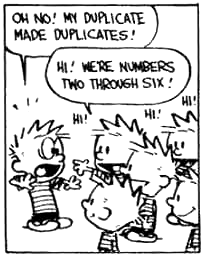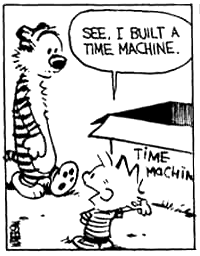
Primer
Shane Carruth, 2004
Premise
A couple of guys build a time machine in their garage. A convoluted puzzle movie
ensues.
Evaluation
The detractors of this film say that it is baffling, impenetrable, amateurish.
Its advocates call it gloriously baffling, brilliantly impenetrable, stylishly
amateurish. My experience, I discovered, was typical: about halfway through I
lost track of what was happening, and everything thereafter was so much sound
and fury signifying not a whole hell of a lot. See, the movie is about these
guys who invent a machine that can send you back in time to the point that it
was turned on, provided you're willing to sit there in a small box for hours,
breathing from an oxygen tank, while time flows backward at exactly the same
rate that it flows forward. This means that they can go back and revise the
timeline. The gimmick of the movie is that you think you're watching things
happen for the first time but you're actually already on the ninth revision of
the timeline. You have to piece together what must have happened in the previous
eight as the two guys went back and tried to undo each other's changes, making many
 | |
duplicates of themselves along the way. This is pretty much impossible to
follow the first time through. After the movie was over, I read a writeup of the
timelines on
Wikipedia and
I still didn't get it. Then I read it again. And again. Then I went to sleep.
Then I woke up and went to work and came home and read it again. Then I rewatched
the movie in one window with the timeline writeup in another. And this time I was
able to make sense of what I was seeing. I understood the plot. And then I said
enh.
I mean, sure, points to the director for making a real movie on a $7000 budget.
Points for managing to get a 78-minute movie out of 80 minutes of footage. (By
necessity, Carruth had to adopt Ed Wood's attitude toward second takes. Out of
focus? Nah, atmospheric!) Points for grounding a fantastical concept in the
real world. Big points for the leadup to the revelation of what exactly these
guys have built. But the main plot is complexity for the sake of complexity.
In the end, it's just a puzzle movie. Mike D'Angelo, whose 88 for Primer
was the reason I watched it, wrote five years earlier about the movie Go
that it would have been his #1 film of 1999 "had it even managed to create the
illusion of being about something" — yet I would argue that even
Go had as much thematic weight as Primer. Primer's
defenders say it's about greed and trust and whatnot, but you can make an
equally compelling argument that Go is about the balance between the
poor judgment of youth and the ability of the young to rebound from the
consequences of their mistakes. And then you say c'mon and admit that both
films are largely about their own mechanics. And that Go was funnier
and had Sarah Polley in it.
Commentary
I imagine that Carruth got a pretty good return on his $7000 investment. I
hope William Sleator got a cut. Primer is highly reminiscent of
The Green Futures of Tycho, Singularity, The Boy Who Reversed
Himself, The Duplicate, and Strange Attractors — and
those are only the ones I read before losing track of Sleator in the early
1990s. Hmmm. I see here in Wikipedia that he's since written ten more. One
of them is called The Boxes. The one after that is called Rewind.
Crikey, this bibliography is practically a Primer plot summary.

Return to the Calendar page!
|



